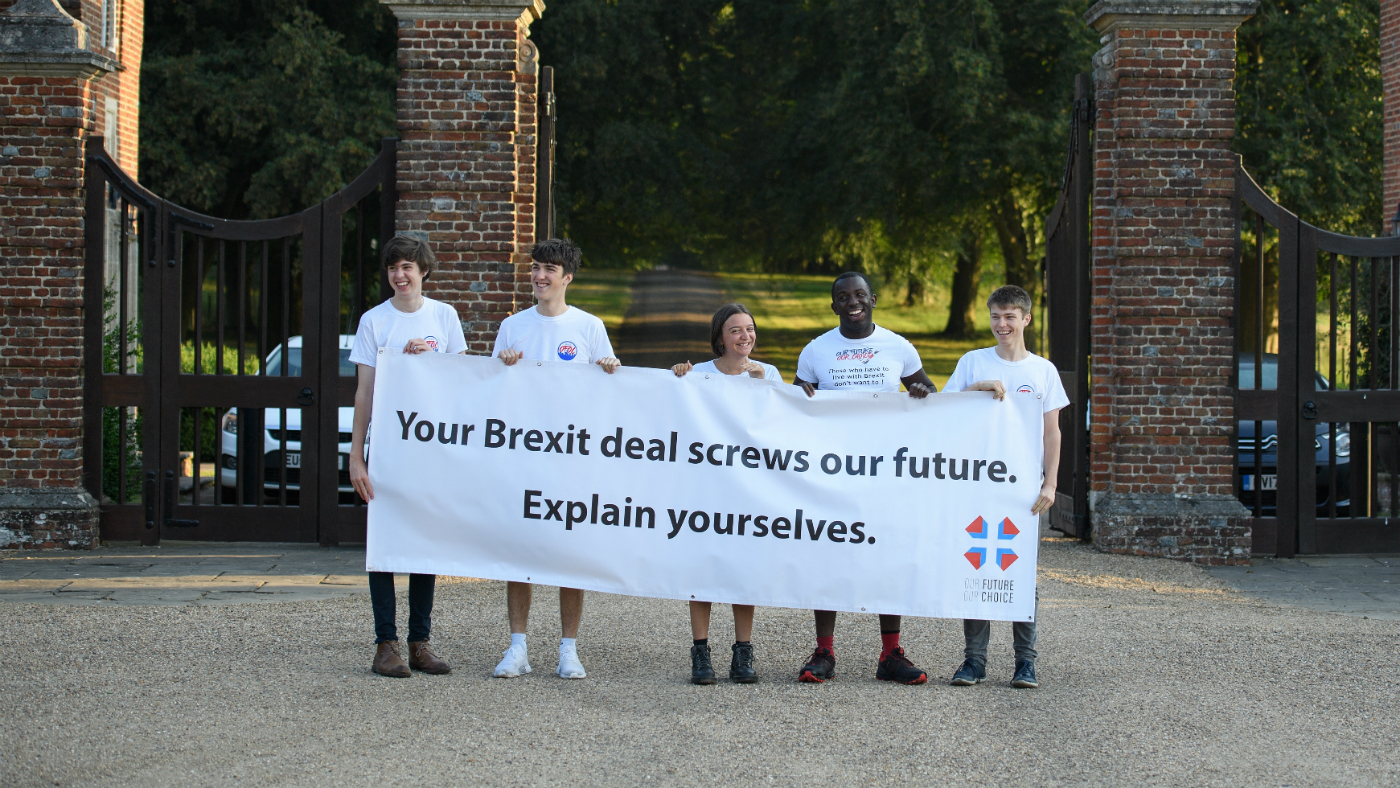No-deal Brexit ‘could cost millennials £108,000 each’
Analysis of Brexit scenarios finds Norway-style trade agreement best for young people

A free daily email with the biggest news stories of the day – and the best features from TheWeek.com
You are now subscribed
Your newsletter sign-up was successful
Young British people stand to miss out on more than £100,000 each in lost earnings by 2050 if the UK goes ahead with a no-deal Brexit, a new report warns.
Analysis by campaign group Our Future Our Choice, which is backed by John Major, used models by Oxford University economist Tommy Peto that draw on government Brexit briefing papers to predict the economic impact of the various potential Brexit scenarios.
The research found that in the event of a no-deal Brexit, in which the UK would default to World Trade Organization (WTO) trade rules, the average young person starting work now would earn between £44,000 and £108,000 less over the next 32 years.
The Week
Escape your echo chamber. Get the facts behind the news, plus analysis from multiple perspectives.

Sign up for The Week's Free Newsletters
From our morning news briefing to a weekly Good News Newsletter, get the best of The Week delivered directly to your inbox.
From our morning news briefing to a weekly Good News Newsletter, get the best of The Week delivered directly to your inbox.
In the case of a free trade agreement (FTA) Brexit, a scenario based on Canada’s deal with the EU, those losses stand at between £30,000 and £72,000 by 2050.
The best form of Brexit for young people appears to be membership of the European Economic Area (EEA), an arrangement similar to Norway’s, but even that is forecast to cost them up to £32,000 compared with remaining in the EU.
The findings back up claims that “at a time of sky-high house prices and crippling student debt, the under-30s will be the biggest losers” of the UK quitting the European Union, says Metro.
The Independent adds that the study “lays bare the full cost of Brexit for the generation that opposed it”.
A free daily email with the biggest news stories of the day – and the best features from TheWeek.com
In the foreword to the report, former prime minister Major says: “Under every scenario that has been independently modelled - even by our own British Government - the UK will be poorer and weaker, and the poorest regions and the least well-off will suffer the most.”
“I would urge every parliamentarian to read and absorb the findings of this report,” he continues, adding that Brexit “was never the choice of the young, who voted overwhelmingly to remain in the EU while their elders voted to leave”.
The report also calls for a second vote on the final terms of the Brexit deal - known as the “People’s Vote” - in order to give a voice to younger people that were not old enough to vote in the 2016 Brexit referendum.
“Since June 2016 there are nearly two million more young people eligible to vote. It is only right they have a say in their nation’s future,” says Major.
-
 Crisis in Cuba: a ‘golden opportunity’ for Washington?
Crisis in Cuba: a ‘golden opportunity’ for Washington?Talking Point The Trump administration is applying the pressure, and with Latin America swinging to the right, Havana is becoming more ‘politically isolated’
-
 5 thoroughly redacted cartoons about Pam Bondi protecting predators
5 thoroughly redacted cartoons about Pam Bondi protecting predatorsCartoons Artists take on the real victim, types of protection, and more
-
 Palestine Action and the trouble with defining terrorism
Palestine Action and the trouble with defining terrorismIn the Spotlight The issues with proscribing the group ‘became apparent as soon as the police began putting it into practice’
-
 Trump touts pledges at 1st Board of Peace meeting
Trump touts pledges at 1st Board of Peace meetingSpeed Read At the inaugural meeting, the president announced nine countries have agreed to pledge a combined $7 billion for a Gaza relief package
-
 Should the EU and UK join Trump’s board of peace?
Should the EU and UK join Trump’s board of peace?Today's Big Question After rushing to praise the initiative European leaders are now alarmed
-
 How corrupt is the UK?
How corrupt is the UK?The Explainer Decline in standards ‘risks becoming a defining feature of our political culture’ as Britain falls to lowest ever score on global index
-
 The high street: Britain’s next political battleground?
The high street: Britain’s next political battleground?In the Spotlight Mass closure of shops and influx of organised crime are fuelling voter anger, and offer an opening for Reform UK
-
 EU-Mercosur mega trade deal: 25 years in the making
EU-Mercosur mega trade deal: 25 years in the makingThe Explainer Despite opposition from France and Ireland among others, the ‘significant’ agreement with the South American bloc is set to finally go ahead
-
 Biggest political break-ups and make-ups of 2025
Biggest political break-ups and make-ups of 2025The Explainer From Trump and Musk to the UK and the EU, Christmas wouldn’t be Christmas without a round-up of the year’s relationship drama
-
 Who is paying for Europe’s €90bn Ukraine loan?
Who is paying for Europe’s €90bn Ukraine loan?Today’s Big Question Kyiv secures crucial funding but the EU ‘blinked’ at the chance to strike a bold blow against Russia
-
 ‘The menu’s other highlights smack of the surreal’
‘The menu’s other highlights smack of the surreal’Instant Opinion Opinion, comment and editorials of the day